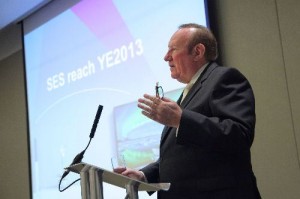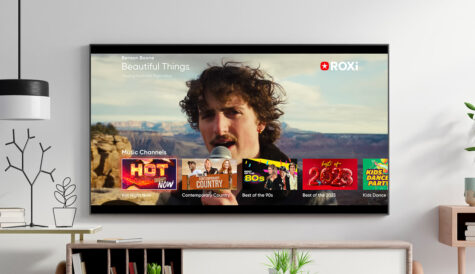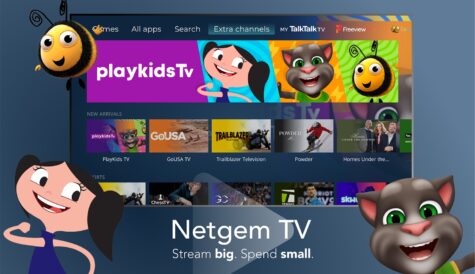Decline of broadcasting much exaggerated, says Neil
The decline of the mainstream broadcasting industry and of traditional TV viewing has been much exaggerated, and the UK industry in general is in robust health, according to broadcaster and journalist Andrew Neil, delivering a keynote speech at satellite operator SES’s 2015 Satellite Monitors event.
Viewing on tablets, laptops and smartphones only accounts for about 2% of viewing and most viewing is still live, despite the extent of DVR penetration, said Neil. Some 83% of viewing is still live, while most recorded content is viewed within one or two days.
“The idea that viewers wanted to become their own scheduler…has turned out not to be true. DVRs…have not shattered the power of the mass market,” said Neil, citing the continued robustness of TV advertising growth. “If you’re making £5 billion [€7 billion] in revenue and you’re up 6%, you business is hardly going to hell in a handcart,” said Neil.
Measuring viewing on other devices and making it part of the currency of the advertising business will be important, said Neil, although BARB faces challenges in doing this. In the US, said Neil, traditional viewing has declined much more steeply, with the ratings plunge having a direct impact on ad revenues. “At some point that will happen here too,” said Neil.
“Those who measure our viewers aren’t keeping up with technological change,” he said, citing the fact that an estimated 70% of viewers of the popular Tonight show aren’t measured or monetised.
There is a still a long way to go before distribution can move to the net, but the two dominant means of distribution are likely to be the net and satellite, said Neil. It is likely that most content in the future will be stored centrally, removing the need for recording devices and for time-shifted linear channels.
“The main screen will remain the main screen, and 4K will give it a new lease of life,” said Neil, despite some viewing migrating to other devices.
Turning to the UK, Neil said that the BBC sometimes seems to have stumbled from one crisis to another, with Charter renewal now overshadowing other considerations. “Given that we’re probably in for a messy election result, it’s likely that nothing will happen before the autumn,” said Neil. He said that the House of Commons Media Select Committee has called for a levy on all households to replace the current licence fee in the longer term. However, it is likely that the licence fee will continue for the next Charter period, he said. However, said Neil, the BBC faces a tight financial settlement and the likelihood of regulation by Ofcom. “There will be a smaller BBC with more emphasis on global sales,” said Neil.
Neil said the BBC has been slow, like all broadcasters except Channel 4, in capturing data about how its viewers use the service. He said that the BBC would likely emphasis increases in productivity and sales of content overseas in the run-up to Charter renewal, and that it would be interesting to see if the BBC could make BBC Three a successful online service.
Commercial broadcaster ITV has produced impressive results, with spot advertising now only accounting for 55% of income at a time when profits are seeing double-digit growth. ITV Studios now produces revenues of around £1 billion on its own. “ITV sees itself as an antidote to fragmentation,” he said. “It has increased its programming budget to over £1 billion a year.”
Neil said ITV was now an attractive takeover target, particularly because of its “fantastic production capability”.
On the pay TV front, Sky is now a multiplatform business across five countries where there are 60 million households that currently don’t take pay TV. Sky now spends £4.6 billion on content across all countries.
Neil said Sky could afford its massive investment in sports rights and had extended its HBO deal to 2020, blocking other pay TV operators from getting hold of this programming and ensuring that HBO does not go direct to consumer as it has in the US and is doing in Scandinavia.
Neil predicted that Sky could look to further international expansion, for example in the Nordic countries.
Sky is seeing a 40% rise in on-demand viewing every year and is moving to become a quad-play provider through its deal with O2. “I think Sky is also going to move to basing its programming in the cloud, with a cloud-based DVR,” said Neil. “Sky has stayed ahead of the game because it is an extremely well-run company.”
Neil said Virgin Media is expanding its footprint to 17 million homes and has seen strong net growth and falling churn. “Virgin Media is helped by the fact that more people are viewing content on broadband,” he said.
BT is still sitting on a large cash pile, said Neil, and has continued to see strong growth. “Using sport as a marketing tool has proved successful,” said Neil. However promises of a wider content play have yet to be realised, he said.
Neil said Netflix remains the poster child of OTT TV, with 57 million subs worldwide including three million in the UK. However, he said, it remained a low margin business, with a market cap based on expectations that it will be able to increase margins. Netflix is nevertheless investing three times as much in original programming this year as last.
Finally, said Neil Channel 4 is “in a kind of limbo”, while Channel 5 is “in the hands of Viacom”. Channel 4’s strength is its 11 million registered viewers, which is “advertising gold dust”. However, its viewing share has declined.
“Our broadcasters are generally in good shape and there is a combined £6 billion of production money. Despite changes we are in pretty good shape as an industry,” said Neil.




